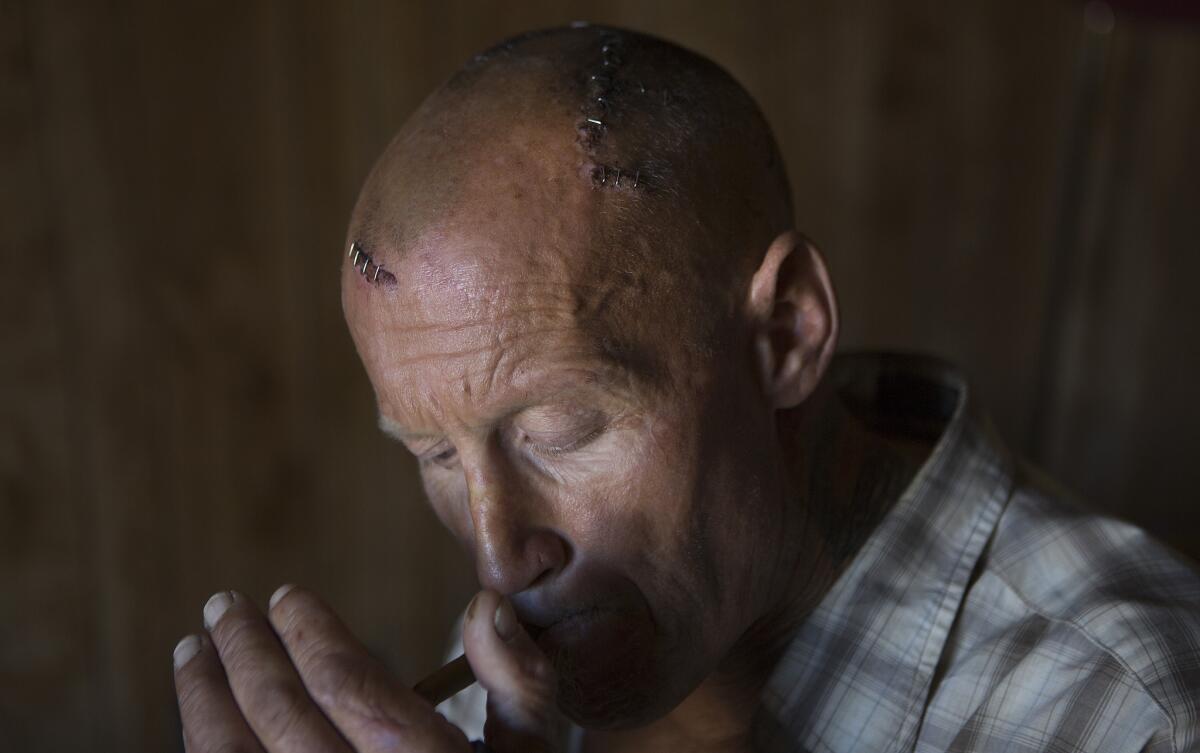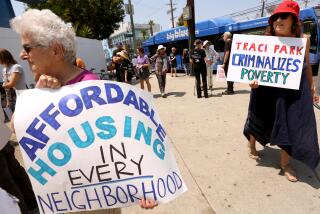Ventura faith community condemns recent attacks on homeless

After Rabbi Lisa Hochberg-Miller learned a homeless man had been set on fire while sleeping on a Ventura beach, she used her daughter’s poster paint to make two signs. They read, “Where is our humanity?” and “Shame on us.”
She took these expressions of her anguish to a Jan. 29 rally sponsored by the faith community on the steps of City Hall.
“We just said, ‘We have to speak up,’” said Hochberg-Miller, of Temple Beth Torah in Ventura. “How can we not speak up? There has to be a response.”
That was the sentiment of many shocked by the Jan. 17 incident involving John Frazier. Two weeks later, when another homeless man, John Stephen Wood, was beaten with a baseball bat and stabbed several times by five teenagers, residents were forced to look at an issue some would prefer to leave to social workers and religious organizations.
“These tragic incidents bring awareness to the entire community,” said Pastor Jim Duran of River Community Church in Ventura. “More people are realizing we need to do something about it.”
Ventura is one of hundreds of cities and counties across California grappling with homelessness, especially those along the coast, where people without permanent shelter tend to congregate because of the mild weather. Many communities follow the guidelines suggested by the U.S Interagency Council on Homelessness in its goal to end chronic homelessness in 2017.
That model takes a “housing first” approach that aims to secure temporary and eventually permanent housing for homeless families and individuals, including military veterans. Then it can match them with appropriate services to address the issues that landed them on the streets in the first place, including drug and alcohol treatment, mental health counseling and job training, said Matthew Doherty, interim executive director of the federal agency.
Ventura leaders point to outreach programs that have reduced the homeless population’s one-day count from 701 in 2012 to 495 last year. Yet critics, including some in faith-based organizations, say the county and city are not working fast enough.
“If the hills were on fire, there would be an emergency shelter opened today at the fairgrounds and a whole group of people would be there to take care of their animals,” said Jan Christian, minister at Unitarian Universalist Church of Ventura. “There’s a different sort of fire burning right now, and it’s killing people, and there’s no coordinated and compassionate response.”
Ventura Mayor Cheryl Heitmann called the attacks “unconscionable” but said they were isolated incidents and not reflective of the city of 106,000 as a whole.
“It’s not the norm,” Heitmann said. “This is not who we are, and it’s not tolerated. We want to keep our community safe, and that includes everybody.”
She pointed to a number of initiatives aimed at getting people off the streets, including a 10-unit complex that will house homeless veterans with mental illness; Safe Sleep, which allows people to sleep overnight in their cars in 15 designated spaces in the city, with access to bathrooms; and Homeless 2 Home, which has placed 256 people in permanent housing over the last 11 months.
An additional 50 people are in the pipeline for the service, said Peter Brown, community services manager for Ventura and Oxnard.
“It’s an ongoing, complex issue,” Heitmann said. “We’re proactive compared to many other cities, but there’s always more that can be done.”
Ventura also is home to the county hospital and jail, and people released from those institutions with nowhere else to go often end up staying in Ventura, said Duran, who runs the City Center, a converted downtown motel that houses 16 families and will soon make room for 14 homeless veterans.
Despite the progress, Christian and others say the city also has put up roadblocks. When members of her church tried to feed the homeless in public parks last year, they were informed they needed a permit to serve food.
“The city told us we were in violation of health code standards,” Christian said, although it was OK to feed the pets of homeless people.
They also point to Operation Embrace, a program run by Harbor Church that provided meals, showers and religious services to the homeless. The city denied its conditional use permit last year, saying it was inappropriate for the residential neighborhood. The church is next to an elementary school, a park and a day care center.
Neighbors had complained about a rise in thefts and burglaries, people defecating and sleeping on their lawns, drugs and needles on the street and encounters by children and teens with participants or those turned away from the program.
The church filed a federal lawsuit against the city to reopen Operation Embrace, but a judge denied the request. Harbor Community appealed the decision to the U.S. 9th Circuit Court of Appeals, which has not yet ruled.
After Frazier was set on fire, Hochberg-Miller and other clergy spoke to their congregations about it and invited worshipers to the rally. About 100 people took part in the show of grief for a man none of them knew personally but in some ways knew all too well.
“They are our neighbors and people we should care about,” said Sue Brinkmeyer, former chairman of the Ventura Social Services Task Force, which coordinates homeless services. “Even the man burned on the beach, he’s not just a vagrant, a transient or someone to be scorned. He was someone who lived in this community. We know these people.”
Frazier, 58, told police that three men in their late teens or early 20s with shaved heads poured lighter fluid on him before igniting it in the early Jan. 17.
But no accelerants were found on Frazier’s belongings, said Sgt. Ryan Weeks of the Ventura Police Department, and investigators have been unable to talk with him again because he remains unconscious at Los Angeles County-USC Medical Center. He suffered second- and third-degree burns over nearly 40% of his body.
Two weeks later, Wood was beaten with a baseball bat in a beach parking garage after one of his assailants asked him for a lighter. When he tried to escape, the attackers, described as five teenagers, ran after him and stabbed him six times in the back and buttocks.
No suspects have been arrested in either case, which occurred less than three miles apart.
Although little is known about Frazier, Wood, 46, called “Woody” by his friends, was born and raised in Ventura. Wood was familiar to caseworkers who tried over the years to give him assistance, but their offers were rejected, Brown said. This put him in the category of homeless people labeled “service-resistant.”
On Tuesday, the carpenter by trade sat in a motel room that church donors had paid for so he wouldn’t have to recover on the streets. Lines of staples zig-zagged across his shaved head.
“They just clocked me in the melon,” Wood said of the Feb. 1 attack. “But they couldn’t keep me down.”
Twitter: @amcovarrubias
More to Read
Sign up for Essential California
The most important California stories and recommendations in your inbox every morning.
You may occasionally receive promotional content from the Los Angeles Times.











